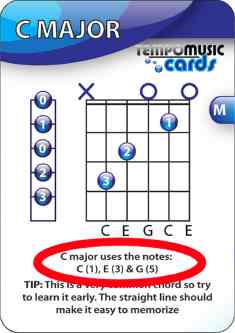This simple game will give you a fresh way to come up with interesting chord progressions next time you’re faced with the dreaded writer’s block or want to try something different. It’s based on the word game ‘last letter’ where you say a word then the next person must come up with a word that starts with the last letter of the first word.
For example: Cat, Tiger, Rabbit, Turtle, Elephant, and so on. The difference with this game is that you will be using chords and the notes in the chords to pick the next chord.
Steps for the game:
- Pick a chord
- Pick the last note out of the chord (refer to the chord formula)
- Pick a chord based on that note
- Repeat until you have enough chords
An example using playing this game:
Let’s say the first chord we pick is Em. The chord Em uses the notes: E G B. The last note in that chord formula is B so we can pick any chord based on B now. So Lets pick B7. B7 uses the notes: B D# F# A. So the next chord will be based on A. Let’s pick Am7 which uses the notes: A C E G. For our final chord we will pick G Major.
So our chord progression will be:
Em B7 Am7 G
If you pick a chord and it ends with a note such as C# or G# and you don’t know any chords based on C# or G#, you can either pick the second last note of the chord or pick a different chord that ends in a note you’re more familiar with.
When you play through the chords you will find you either like how they sound or you don’t. Either way, try to come up with a way to make those chords work together. This is a great creative exercise to get you thinking of different ways to play chord progressions. Something as simple as this is a great way to work through any writer’s block and try something different. If you don’t like the sound of the progression and can’t get it to sound right, simply start again – it’s very simple to come up with a new progression.
How flash cards can help you

Using flash cards like the 50 Essential Chords Pack to help you find and pick out chords will help you in several ways.
First, the chord formula and the chord notes are displayed on every card (see picture to the right) so it’s very simple to pick out the last note in every chord. This will help you learn the notes faster.
Second, if you get stuck on one of the chords (eg: the last note is G# and you don’t know any G# chords), you can easily find several alternative chords that will end on a note you feel more comfortable with (eg: ending with G).
Third, by using the cards you aren’t limited to the chords you have in your head and can learn new chords you normally wouldn’t try.
All these small points make a big difference when taken together and will help you learn faster and come up with more chord options.
What this simple game does for you:
- Helps you learn and memorize the notes in a chord
- Gets you thinking ‘outside the box’ with chord progressions
- Gives you a quick and fun way to come up with song ideas
- Teaches you why certain chords will work together while others won’t.
Give the game a go and see how many unique sounding progressions you end up with. Once you get the hang of this game you can easily come up with similar games to try out. Feel free to leave a comment below if you have any other similar games people can try out or any great sounding progressions you come up with using this game.



